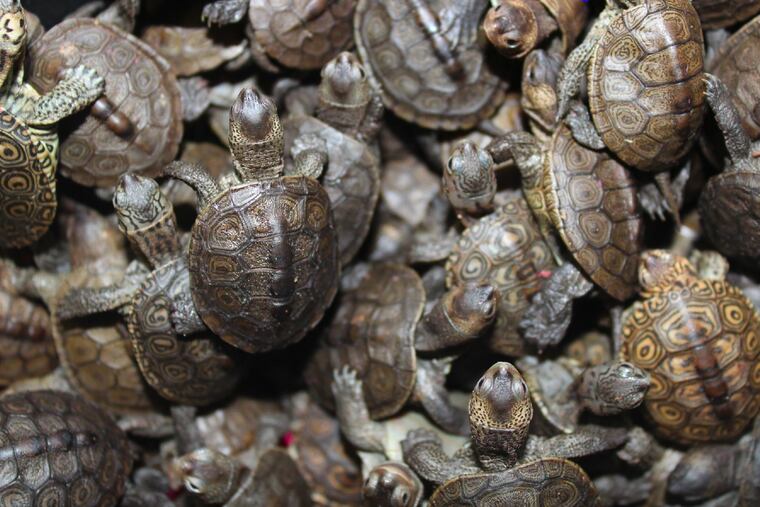Bucks journalist sentenced to 6 months for trafficking turtles in ‘inhumane’ conditions
Adult turtles were wrapped in duct tape and stuffed in socks to prevent them from scratching at or clawing their way out of the boxes he used to mail them. Prosecutors said he sent extra hatchlings to buyers with each purchase, figuring some would die in transit.

David Sommers’ career as a turtle trafficker began innocently enough.
The Bucks County retired journalist told a federal judge that it was after years of passing injured diamondback terrapins on the highway during family trips to the New Jersey Shore that he stopped one day, figuring he could do something to help.
He started taking turtles home to repair their cracked shells, he said, and sealed their damaged eggs with epoxy to give hatchlings a chance to survive. But when he raked in more than a half-million dollars in six years selling the federally protected species online, fish and wildlife authorities took note.
On Thursday in Philadelphia, Sommers, 64, of Levittown, was sentenced to six months in prison and six months’ house arrest for violating state and federal conservation laws protecting the declining species.
And although friends and relatives described him in court as a devoted animal lover and conservationist, prosecutors said his business tactics and the “inhumane” methods he used to ship his product proved otherwise.
“The defendant loved payment for the turtles,” Assistant U.S. Attorney Joan E. Burnes said. “His business model was very simple: to steal the wildlife from their nests, to catch others in the wild, to take them out of their natural habitat, and … to ship them to paying customers.”
Sommers kept thousands of scavenged hatchlings in tubs in his home and shipped the turtles he sold on kingsnake.com — a popular site among reptile collectors — to 43 states and Canada.
He charged between $10 and $120 and, in 2014 alone, reported to the IRS that he earned more than $99,000 from his side business.
Adult turtles were wrapped in duct tape and stuffed in socks to prevent them from scratching at or clawing their way out of the boxes he used to mail them. He sent extra hatchlings to buyers with each purchase, prosecutors said, figuring that some would die in transit.
And when U.S. Fish and Wildlife agents raided his home in 2017, they found oxytocin, a hormone used to induce female turtles to release their eggs.
For his own part, Sommers — a retired reporter for news outlets including the Bucks County Courier Times and the Trentonian — told U.S. District Judge Anita Brody that he never set out to commit a crime.
“I wasn’t trying to destroy turtles,” he said. “I was trying to help them. I certainly never believed I was putting turtles in danger.”
Valued for the diamond-shape markings on their shells, diamondback terrapins are a species in sharp decline. New Jersey law prohibits taking or transporting the semiaquatic reptiles from their natural habitats in swamps and marshlands up and down the East Coast.
Federal law bans misrepresenting such sales by claiming — as Sommers did in online advertisements — that wild turtles actually were bred in captivity.
Those false claims were among the reasons Brody cited Thursday in deciding that Sommers knew he was committing a felony despite his claims of naïveté.
In 2014, Canadian customs officials intercepted a FedEx package Sommers had shipped, claiming it contained a $10 book. Instead, they found 11 terrapin hatchlings inside, concealed in flimsy pouches.
He had been warned previously by the U.S. Postal Service that shipping turtles was illegal. And when New Jersey wildlife officials stopped him last year at the Great Bay Boulevard Wildlife Management Area in Little Egg Harbor Township, Ocean County, to caution him that raiding turtle nests was a crime, he showed up again the next day in a different car to hunt for eggs.
Still, the sentence Brody imposed Thursday could have been far worse. Federal sentencing guidelines called for a prison term of roughly three years. Prosecutors also sought a fine of $250,000 and an order requiring Sommers to pay $2.5 million to the State of New Jersey in restitution.
The New Jersey Division of Fish and Wildlife estimated that it would cost more than $17,000 to rehabilitate and release each of the terrapins seized from Sommers’ home — a figure that sent Sommers’ attorney, Louis R. Busico, recoiling.
“My God,” Busico said. “I wish every child within a few blocks of this courthouse had $17,000 a year from the government to take care of them.… It seems like a straight-up arbitrary number.”
In the end, Brody settled on a $250,000 restitution payment and did not assess a fine. She wished Sommers luck as he left the courtroom with his adult son and daughter, under orders to report to prison in October.